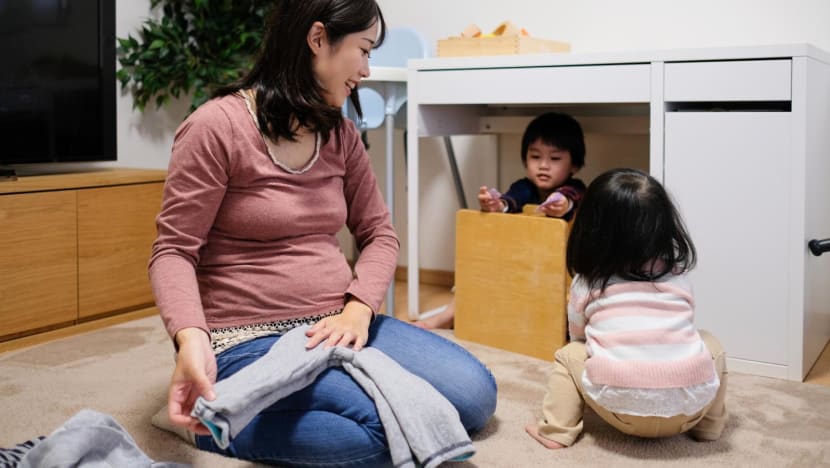Commentary: Japanese flyer advising new mums to massage husbands sparks debate
It seems almost unbelievable that such outdated beliefs and misogynistic views still exist, says author and mother-of-two Vivian Teo.

File photo of a mother taking care of her sleepy and anxious baby son. (Photo: iStock/Dobrila Vignjevic)
SINGAPORE: A Japanese city recently caused a furore after unsolicited advice it gave to heavily pregnant mothers on how to keep their husbands happy made the rounds on social media.
Flyers created by Onomichi city in Japan’s Hiroshima prefecture suggested how the women should behave after giving birth, including give their husbands massages, prepare their lunch every day, handle childcare and housework, greet their husbands with a “welcome home,” and always “have a smile on her face”.
According to local media, women in their seventh month of pregnancy in Onomichi city have been receiving the flyers since 2018, but the matter sparked public anger after it was posted on the internet.
On Jul 25, the mayor of Onomichi city apologised, saying the content in the flyers was not in line with the sentiment of pregnant women and others involved in raising children.
UNBELIEVABLY MISOGYNISTIC
It seems almost unbelievable that in times when strides have been made toward gender equality, such outdated beliefs and misogynistic views still exist.
The content in the flyers was based on surveys with about 100 fathers, who were asked what they liked and disliked about the things their wives said and did.
Some of the most popular responses to a question on what the men disliked most were: "She was busy taking care of the baby and not doing chores" and "She didn't do anything for me".
Expectant women and new mothers already have it hard enough - from the extra weight they carry, hormonal changes, backaches, postpartum recovery, breastfeeding and lack of sleep, just to name a few - yet they are expected to cook, clean and serve their husbands like kings?
Some may say that this is because of Japan’s patriarchal and conservative society - the country fell to a record low 125th position out of 146 countries in the World Economic Forum’s 2023 Global Gender Gap Index.
Only 10 per cent of its parliamentary positions and 8.3 per cent of ministerial positions are held by women. And while 54.2 per cent of its women are in the labour force, a survey by the Cabinet Office in March showed that more than 80 per cent of Japanese people believe women are burdened by spending so much time on childcare and housework.
WOMEN’S WORKLOAD
But the reality is that outside of Japan, such gender stereotypes are pervasive in many societies, with women primarily responsible for household chores and childcare.
A 2022 report by the Asia-Pacific Economic Cooperation (APEC) noted that women in the region spend an average of 4 hours and 20 minutes daily on unpaid caregiving and domestic work, almost three times the time spent by men.
Similarly, an Ipsos & United Women Singapore 2021 study found that while there’s been a shift in attitudes between generations on the sharing of household responsibilities, gender-defined roles still exist.
Women take on more of the daily responsibilities like cleaning and cooking, while men take care of tasks that are less frequent in nature such as repairs and management of tech devices, the survey showed.
With more responsibilities on their shoulders, fewer women (54 per cent) than men (75 per cent) said they were happy about their household and caring responsibilities.
Aside from the physical chores, however, there is an exhausting list of unseen tasks that women take care of to keep a household running and family members happy. This is called the mental load.
As a mother, my mind is constantly working: Are we low on the fruits the kids like to eat; I need to book their dental appointments; do we have enough bread for breakfast; I have to go through spelling with the younger one; the elder one needs a larger-sized pinafore; I need to find a place for Sunday’s dinner with my in-laws.
GENDER STEREOTYPES ARE HARMFUL
Many in my generation and those before me grew up seeing our mothers take care of the house and kids, while our fathers focused on work and had limited involvement in chores and caregiving. So, we grew up following these gender norms.

But if we continue to accept these supposed norms, we do so at the expense of gender equality and women’s well-being and mental health.
“By perpetuating gender inequality and economic disempowerment, unpaid care and domestic work affect women’s health, their education and employment opportunities while also increasing their vulnerability to violence,” APEC said in the 2022 report.
An analysis of 19 studies covering 70,310 people globally, published by The Lancet Public Health in 2022, also found that the more of this unpaid labour women do, the worse their mental health.
This is a good reason to stop perpetuating gender stereotypes and raising generations who think it is acceptable for women to shoulder the bulk of household and caregiving responsibilities.
Gendered expectations start from young. If girls are expected to clean up after meals, while boys are allowed to slack off - because girls are more organised and well, boys are just being boys - they will grow up thinking this is the norm.
“We have to educate and advocate for mindset changes towards gender roles and 'de-feminise' the caregiving and household responsibilities,” said Georgette Tan, president at United Women Singapore, in the Ipsos report. “By ensuring shared responsibilities, this will allow women more time for self-care, pursue their career aspirations and contribute even more to the community.”
TAKING THE INITIATIVE
Men need to realise that they play an equally essential role in raising their children and maintaining the household. They need to step up their game.
I’ve heard many reasons why husbands do not help out as much in their households. One being, “my wife is just better at doing certain chores and when I try to help, I can’t meet her standards and she ends up taking back the task.”
To that I would say to the husbands, work at meeting your wife’s standards, and to their wives, give your husbands time to work at meeting your standards.
There were times when my husband, tasked to buy certain groceries, came back with the wrong brand or type. But instead of complaining, I make do with what he bought. With each grocery run, he is getting better at choosing fresher produce and differentiating between them.
Another reason I often hear from husbands not participating in housework is, “If my wife needed help, she would have asked and I would be happy to help. But she didn’t ask, so she must be alright doing it on her own.”
Guys, the truth is many of us women would rather just forge on with the chores ourselves than ask for help because asking for help and teaching you to do something would just add another item to the many tasks we already have to do.
In that moment, it feels quicker to just do it on our own and yes I know, this only perpetuates the vicious cycle.
So why not show some initiative and offer help without your wife asking? The irony is demonstrating initiative is a desired trait at workplaces which some exemplify at work.
Yet, this showing of initiative does not extend to one’s household though it will help lighten the load on one’s partner.
And ladies, take time to teach and delegate. The vicious cycle has to end somewhere.
The benefits of involved husbands and fathers are clear. So, rather than asking new mothers to cook, clean and give their husband massages, perhaps the advice from Onomichi city would be better directed at husbands to cook, clean and give their wife massages.
Vivian Teo is a freelance writer and children’s book author. She is also a mother-of-two who blogs at her parenting and lifestyle website, vivianteo.com




















